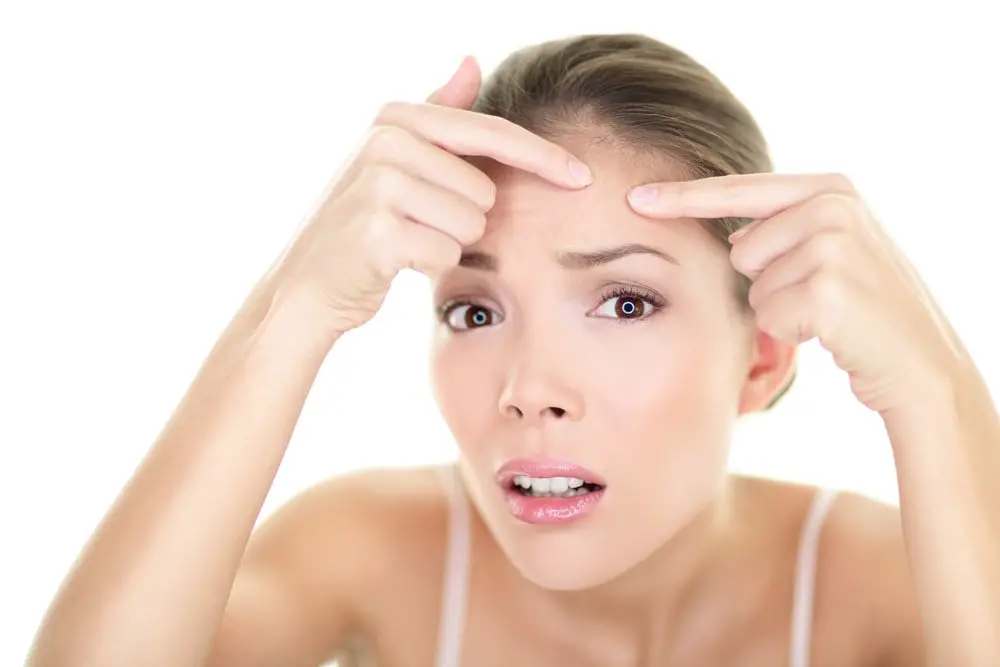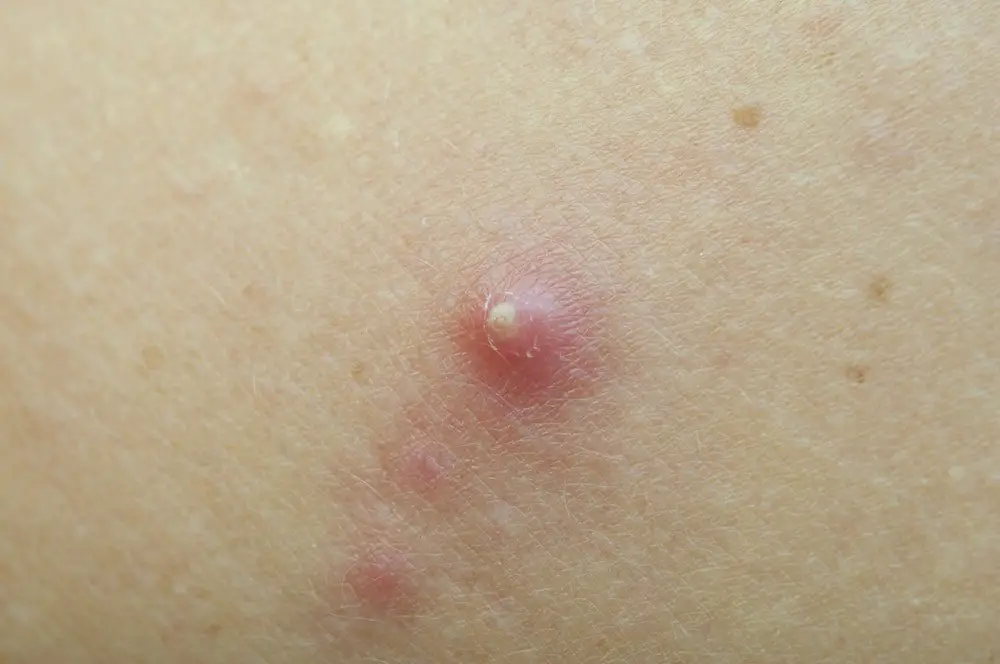More often than we like to admit, people confuse pimple and acne. True, there are a few similarities; however, they are different. Regardless of the confusion, one thing we have been able to reach a consensus on is that neither is a welcomed development on the skin.
Acne vs pimple breakout is one of the many conditions that plague the skin. It could be the sign that you are reaching puberty in teenagers; however, beyond that, it is a bad experience for many.
Acne vs pimples is a term often used interchangeably by many people. If you fall into this category, it is not entirely your fault. This is because they look so much alike, but there are pimple and acne differences. So, what is a pimple, and what is acne?
Table of Contents 1Breaking It Down: The Difference Between Acne and Pimples 1.1What Is Acne? 1.2What Is Pimple?1.3The Cause of Acne vs Pimples 1.4What Causes Acne?1.4.11. Menstruation 1.4.22. Genetics 1.4.33. Environment And Lifestyle 1.4.44. Picking Your Pimples 1.5What Causes Pimples?1.5.11. Puberty And Hormones 2How to Treat Acne vs Pimples 2.1How to Treat Acne? 2.1.11. Over-The-Counter Medications 2.1.22. Healthy Lifestyle2.2How to Treat Pimples2.2.11. Healthy Hygiene 2.2.22. Doctor’s Recommendation 3Conclusion
Breaking It Down: The Difference Between Acne and Pimples
What is the difference between acne and pimples? The difference between acne and pimples is in the formation and the cause. It is safe to say that while pimples might not call for concern, acne is enough to raise eyebrows. But this is not enough insight into the difference between pimples and acne.
What Is Acne?
Also referred to as acne vulgaris, acne is a skin condition that occurs when there are multiple skin breakouts. The breakout is usually in the form of bumps, and the bumps are filled with pus and bacteria.
Acne affects the oil glands and the skin’s follicle. When the body produces too much oil, the build-up of oil mixes with the dead skin cells and clogs the skin pore. In most cases, when bacteria gain access into the clog, it makes an excellent breeding site and causes swelling and redness.
Related Read: The Different Types Of Acne Explained
What Is Pimple?
Pimples, like acne, are caused by excess oil production and dead skin cells. For a teenager, it could mean an usher into maturity with less distress and pain.
The sebaceous glands of the skin produce oil to keep the skin hydrated. But like acne, the oil sometimes mixes with dirt and clogs the pores.
When it mixes with bacteria, it can cause swelling. Unlike acne, pimples do not repeatedly occur over a short period.
In some cases, you might not have more than one or two pimples on your face.
In contrast, acne is characterized by the presence of numerous bumps and swellings on the face.
It is safe to say that for pimple vs acne comparison, pimples could be a symptom of acne, a more severe skin condition.
The Cause of Acne vs Pimples
The primary cause of pimples vs acne is the clog of the skin pore by excess oil, dirt, and bacteria. However, beyond that, there are more reasons why you might have any of the two on your face.
What Causes Acne?
Acne is primarily caused by clog to the skin pores caused by oil, bacteria, and dirt. However, certain factors contribute to make it worse or trigger it in certain people. Some of those factors include:
1. Menstruation
Changes in hormonal balance, especially in women, can trigger acne. For example, during ovulation, the hormonal levels increase to attempt to stop pregnancy.
However, before menstruation, progesterone and estrogen levels drop. As a result, the sebaceous glands produce more oil to lubricate your skin. Unfortunately, the presence of oil can clog the pores and cause acne.
Like other premenstrual symptoms, the hormones can also increase the production of bacteria that causes acne.
2. Genetics
Genetics is another factor that causes and determines the extent of the breakout in people. Although it is unlikely that you’ll inherit the acne gene, genetics is still a substantial contributing factor.
It could be from the way your immune system reacts to acne bacteria or the tendency to produce dead skin cells in excess.
Not just this, it could be that your body produces sebum in excess, and since oily skins trap more bacteria, it may cause a frequent breakout.
3. Environment And Lifestyle
Your environment is another factor that triggers acne formation on the skin. A high-humidity environment, for example, causes acne. Heat and humidity cause an increase in oil production.
Cold weather, on the other hand, stresses the skin. This is because low humidity levels cause dehydration. By implication, the skin produces more oil to keep you hydrated.
It can also be due to your lifestyle and the consumption of certain medications. Stress, lack of enough sleep, alcohol consumption, and smoking are all features that contribute to acne breakout.
4. Picking Your Pimples
Pimples are not as severe as acne. However, some are filled with bacteria-filled pus. When you pick or squeeze an existing pimple, the pus may spill bacteria unto your skin.
Not just this, it can spread and affect other healthy parts of the skin.
What Causes Pimples?
1. Puberty And Hormones
The most recurring cause of pimple is puberty. This is because puberty is when the hormones become active in the body. As a result, it transforms the body from a child’s to an adult.
But that is not to say that it is the case for everyone going through puberty. However, a more significant population develops pimples during puberty.
Androgen in men is a hormone that helps with the development and sustenance of certain male characteristics and sex organs. It is produced in the testes in men and ovaries in women.
However, when the hormones are released in a body going through puberty, it can aid pimples’ development.
How to Treat Acne vs Pimples
How to Treat Acne?
1. Over-The-Counter Medications
OTC medications are ideal for treating acne. This is because the medications contain active ingredients like salicylic acid, benzoyl peroxide, and topical retinoid-all handy for treating acne.
However, it would help if you consult a dermatologist before proceeding to buy any of the medications.
Some acne, like cysts, can be painful and might require surgical intervention to remove. Hence, you should consult your physician before using any medication.
2. Healthy Lifestyle
Stress sometimes causes you to scratch and pop existing pimples. However, you should not. It will also help if you avoid touching the site with your phone and hands. A healthy diet that is low in sugar and greasy food helps with acne.
Related Read: Acne Diet – What To Eat For Clear Skin
You should also drink more water, eat less artificial food, and a nutritious diet. If you’ve been to the gym or engaged in a sweaty activity, you should take the cloth off and wash as soon as you can.
How to Treat Pimples
1. Healthy Hygiene
Since pimples are not as painful as acne, it will disappear in days. However, it would help if you did not try to pop them. Not just this, you should keep healthy hygiene. You should:
· Wash your pillow cover and sheet regularly
· Wash your face with running water and use mild cleansers
· Don’t scrub your skin vigorously and use exfoliating cleansers
· Avoid oil-based cosmetics and hair products
2. Doctor’s Recommendation
You can also take oral antibiotic treatment to treat pimples. However, it should be supervised by a physician.
Conclusion
The question of what is the difference between acne and pimples is a reoccurring question. Interestingly, the answer is not far-fetched. While one is minimal, the other can be painful. Plus, pimple does not break out in numbers. When it does, it could be a symptom of acne. So, you call one the herald of the other. Now you know the difference between pimple and acne.



